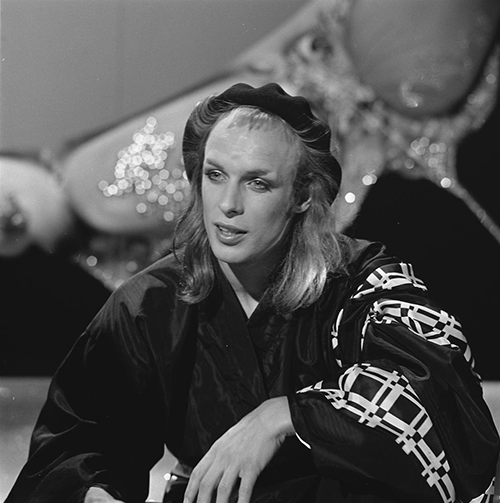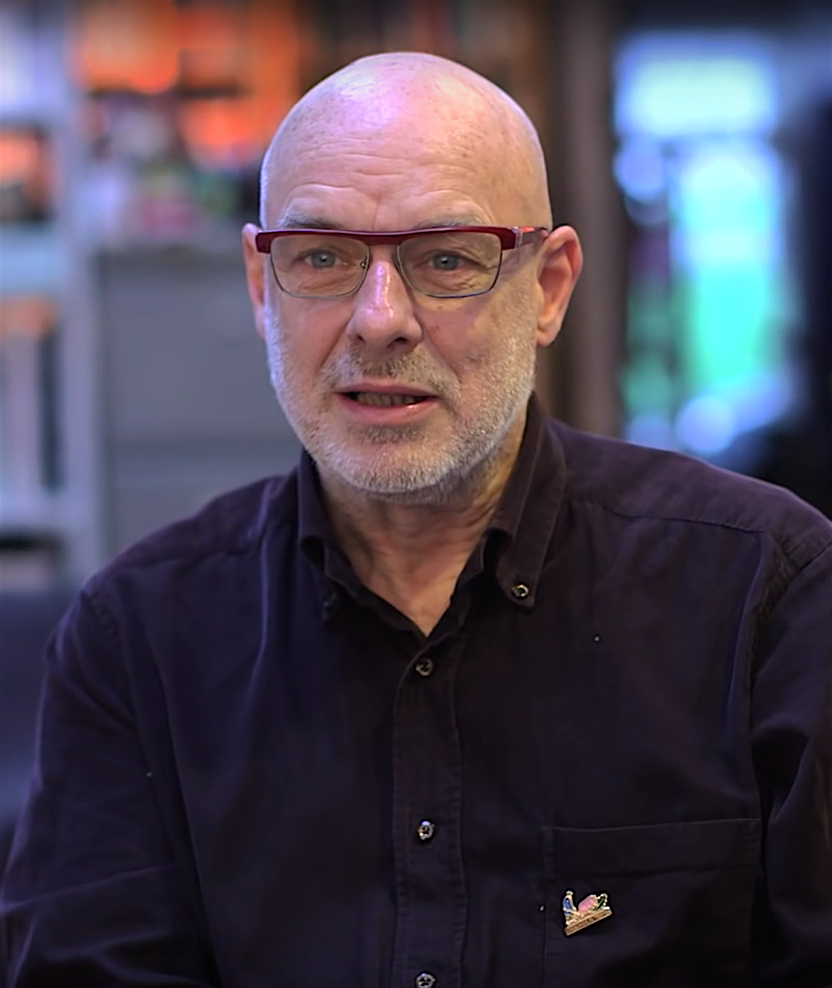|
Oblique Strategies
Oblique Strategies (subtitled ''Over One Hundred Worthwhile Dilemmas'') is a card-based method for promoting creativity jointly created by musician/artist Brian Eno and multimedia artist Peter Schmidt, first published in 1975. Physically, it takes the form of a deck of printed cards in a black box. Each card offers a challenging constraint intended to help artists (particularly musicians) break creative blocks by encouraging lateral thinking. Origin and history In 1970, Peter Schmidt created "The Thoughts Behind the Thoughts", a box containing 55 sentences letterpress printed onto disused prints that accumulated in his studio, which is still in Eno's possession. Eno, who had known Schmidt since the late 1960s, had been pursuing a similar project himself, which he had handwritten onto a number of bamboo cards and given the name "Oblique Strategies" in 1974. There was a significant overlap between the two projects, and so, in late 1974, Schmidt and Eno combined them into a singl ... [...More Info...] [...Related Items...] OR: [Wikipedia] [Google] [Baidu] |
Brian Eno
Brian Peter George St John le Baptiste de la Salle Eno (; born Brian Peter George Eno, 15 May 1948) is a British musician, composer, record producer and visual artist best known for his contributions to ambient music and work in rock, pop and electronica. A self-described "non-musician", Eno has helped introduce unconventional concepts and approaches to contemporary music. He has been described as one of popular music's most influential and innovative figures. Born in Suffolk, Eno studied painting and experimental music at the art school of Ipswich Civic College in the mid 1960s, and then at Winchester School of Art. He joined glam rock group Roxy Music as its synthesiser player in 1971, recording two albums with the group before departing in 1973. Eno then released a number of solo pop albums beginning with ''Here Come the Warm Jets'' (1974) and, also in the mid-1970s, began exploring a minimalist direction on influential recordings such as '' Discreet Music'' (1975) and ... [...More Info...] [...Related Items...] OR: [Wikipedia] [Google] [Baidu] |
Wolfgang Amadeus Phoenix
''Wolfgang Amadeus Phoenix'' is the fourth studio album by French indie pop band Phoenix. It was released on 25 May 2009 by V2 Records. While the band's previous work enjoyed a moderate underground following, the release of ''Wolfgang Amadeus Phoenix'' drew the attention of a more mainstream audience. In the US, Phoenix began a promotional tour including performances on several late night talk shows. ''Wolfgang Amadeus Phoenix'' continued to gain momentum with the increased exposure of the tour. The album received critical acclaim with many publications calling it one of the best albums of 2009. ''Wolfgang Amadeus Phoenix'' earned the band a Grammy Award for Best Alternative Music Album at the 52nd Grammy Awards held on 31 January 2010. Background The album credits Phoenix band members Thomas Mars on vocals, Deck D'Arcy on bass, and Laurent Brancowitz and Christian Mazzalai on guitar. Phillipe Zdar produced and mixed the album and played drums on the song "Fences", with Cult of ... [...More Info...] [...Related Items...] OR: [Wikipedia] [Google] [Baidu] |
Outside (David Bowie Album)
''Outside'' (stylised as ''1. Outside'' and subtitled ''The Nathan Adler Diaries: A Hyper-cycle'') is the 20th studio album by English musician David Bowie, released on 25 September 1995 through Virgin Records in the United States and Arista Records, BMG and RCA Records in other territories. Reuniting Bowie with musician Brian Eno following the late 1970s Berlin Trilogy, the two were inspired by concepts "outside" the mainstream, such as various outsider and performance artists. Recorded throughout 1994, the experimental sessions saw Bowie conceive a world where "art crimes", such as murder, pervade society. The resulting ''Leon'' project initially faced resistance from labels due to its uncommercial nature. The project's bootlegging led to additional sessions in 1995 to revise the concept and record more commercial material, inspired by a diary Bowie wrote for '' Q'' magazine. Influenced by the television series ''Twin Peaks'', the nonlinear narrative of ''Outside' ... [...More Info...] [...Related Items...] OR: [Wikipedia] [Google] [Baidu] |
Boys Keep Swinging
"Boys Keep Swinging" is a song by English musician David Bowie, released on 27 April 1979 by RCA Records in the United Kingdom as the lead single from his 1979 album '' Lodger''. It was written by Bowie and Brian Eno and recorded in Montreux and New York City in September 1978 and March 1979. The recording utilised techniques from Eno's Oblique Strategies cards, which resulted in the musicians swapping instruments. Adrian Belew contributed a guitar solo, which he played receiving little guidance and was composited from multiple takes. The song was also built on the same chord sequence as album track "Fantastic Voyage". Musically, "Boys Keep Swinging" contains elements of glam rock, garage rock, funk and new wave, while lyrically, the song deals with the concept of gender identity, featuring various gender-bending lyrics. Bowie himself stated that the song was full of irony. Bowie filmed a promotional video for "Boys Keep Swinging" alongside an appearance on ''The Kenny Evere ... [...More Info...] [...Related Items...] OR: [Wikipedia] [Google] [Baidu] |
Fantastic Voyage (David Bowie Song)
"Fantastic Voyage" is a song written by David Bowie and Brian Eno for the 1979 album '' Lodger''. It has almost exactly the same chord sequence as "Boys Keep Swinging", from the same album. It has also appeared as the b-side to the "Boys Keep Swinging" and "Peace on Earth/Little Drummer Boy" singles, and the US edition of "D.J.". Recording "Fantastic Voyage" was written by David Bowie and Brian Eno during the sessions for '' Lodger'' (1979); its working title was "Portrait of an Artist". Co-produced by Bowie and Tony Visconti, the backing tracks were recorded at Mountain Studios in Montreux, Switzerland in September 1978, while vocals and overdubs were completed at the Record Plant in New York City in March 1979. The sessions saw Bowie and Eno utilise techniques from Eno's Oblique Strategies cards. According to biographer Chris O'Leary, these cards were "part-fortune cookie, part-''Monopoly'' 'Chance' cards", intended to spark creative ideas. Eno and Bowie used them previously to ... [...More Info...] [...Related Items...] OR: [Wikipedia] [Google] [Baidu] |
Sense Of Doubt
"Sense of Doubt" is an instrumental piece written by David Bowie in 1977 for the album '' "Heroes"''. It was the first of three instrumentals on Side Two of the original vinyl album that segued into one another, preceding " Moss Garden" and "Neuköln". Cited as "portentous" and "thoroughly foreboding",David Buckley (1999). ''Strange Fascination - David Bowie: The Definitive Story'': p.324Roy Carr & Charles Shaar Murray (1981). ''Bowie: An Illustrated Record'': pp.92-94 "Sense of Doubt" is one of the darker tracks of the album, with a descending four-note piano motif juxtaposed with "an eerie synth line like a scrap of sound from a silent expressionist-era soundtrack". Brian Eno suggested that the contrasting themes were the result of him and Bowie each following an Oblique Strategies card to guide them in the track's overdubbing, Eno's directing him to "make everything as similar as possible" and Bowie's to "emphasize differences". "Sense of Doubt" was performed on the Italian TV ... [...More Info...] [...Related Items...] OR: [Wikipedia] [Google] [Baidu] |
Lodger (album)
''Lodger'' is the 13th studio album by English musician David Bowie, released on 25 May 1979 through RCA Records. After an eventful year that saw the release of two studio albums, '' Low'' and '' "Heroes"'', and many other side projects in 1977, Bowie embarked on the Isolar II world tour in 1978. During a break in the tour, Bowie regrouped with collaborator Brian Eno and producer Tony Visconti to record his next album. The final release of the Berlin Trilogy, the album was recorded mainly at Mountain Studios in Montreux, Switzerland, in September 1978. Most of the same personnel from prior releases returned, and future King Crimson guitarist Adrian Belew joined from the tour. The recording sessions saw the use of techniques inspired by Eno's Oblique Strategies cards, such as having the musicians swap instruments and play old songs backwards. After the Isolar II world tour, further recording and mixing took place at the Record Plant in New York City in March 1979. Th ... [...More Info...] [...Related Items...] OR: [Wikipedia] [Google] [Baidu] |
"Heroes" (David Bowie Album)
''"Heroes"'' is the 12th studio album by English musician David Bowie, released on 14October 1977 through RCA Records. After releasing '' Low'' earlier that year, Bowie toured as the keyboardist of his friend and singer Iggy Pop. At the conclusion of the tour, they recorded Pop's second solo album '' Lust for Life'' at Hansa Tonstudio in West Berlin before Bowie regrouped there with collaborator Brian Eno and producer Tony Visconti to record ''"Heroes"''. It was the second release of his Berlin Trilogy, following ''Low'' and preceding '' Lodger'' (1979), and the only one wholly recorded in Berlin. Much of the same personnel from ''Low'' returned for the sessions, augmented by King Crimson guitarist Robert Fripp. The album was recorded sporadically in July and August 1977. The majority of the tracks were composed on the spot in the studio, the lyrics not being written until Bowie stood in front of the microphone. The music builds upon its predecessor's electronic and ambient ap ... [...More Info...] [...Related Items...] OR: [Wikipedia] [Google] [Baidu] |
Low (David Bowie Album)
''Low'' is the eleventh studio album by the English musician David Bowie, released on 14 January 1977 through RCA Records. After years of drug addiction when living in Los Angeles, Bowie moved to France in 1976 with his friend Iggy Pop to sober up. There, Bowie produced and co-wrote Pop's debut studio album, ''The Idiot'', featuring sounds Bowie would explore on his next record. After completing ''The Idiot'', Bowie began recording the first of three collaborations that became known as the Berlin Trilogy with American producer Tony Visconti and English musician Brian Eno. Sessions began at Hérouville's Château d'Hérouville in September 1976 and ended in October at Hansa Studios in West Berlin, where Bowie and Pop had relocated. Grounded in art rock and experimental rock and influenced by German bands such as Tangerine Dream, Neu!, Harmonia and Kraftwerk, ''Low'' features Bowie's first explorations in electronic and ambient styles. Side one consists primarily of short ... [...More Info...] [...Related Items...] OR: [Wikipedia] [Google] [Baidu] |
Berlin Trilogy
The Berlin Trilogy consists of three studio albums by English musician David Bowie: '' Low'', '' "Heroes"'' (both 1977) and '' Lodger'' (1979). The trilogy originated following Bowie's move from Los Angeles, California, to Europe to rid himself of worsening drug addiction. Influences included krautrock, the German music genre, and the recent ambient releases of English musician Brian Eno. After cancelling a proposed soundtrack album for ''The Man Who Fell to Earth'' (in which he starred), Bowie embarked on the Isolar tour and then moved to Europe. Before work began on the trilogy, Bowie co-wrote and produced Iggy Pop's debut solo album ''The Idiot'', which features a sound similar to that which Bowie would explore in the trilogy. He also collaborated with Pop for his second solo album '' Lust for Life'' before recording ''"Heroes"''. Both albums were released in 1977. Bowie recorded the trilogy in collaboration with Eno and American producer Tony Visconti. The albums featured ... [...More Info...] [...Related Items...] OR: [Wikipedia] [Google] [Baidu] |






